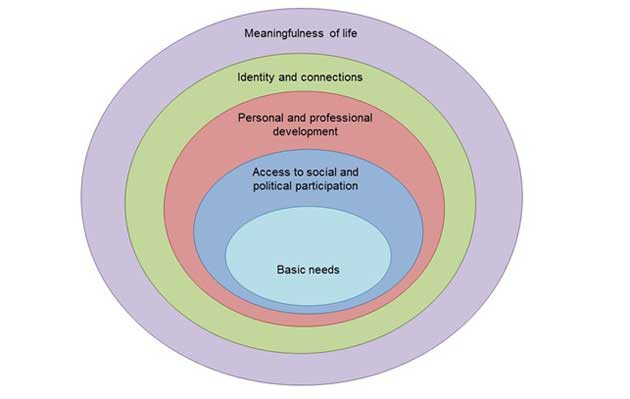Re-Defining Poverty in its Many Dimensions

UNITED NATIONS, Nov 29 (IPS) - Carolina Rivera is a Research Analyst at the Human Development Report Office at UNDP and Monica Jahangir is a Policy and Advocacy Officer at the International Movement ATD Fourth World.
Poverty has many dimensions beyond a lack of money. The need for a better understanding of the multiple ways people experience poverty is gaining momentum, as is the importance of measuring the often - overlapping deprivations people face. Understanding both is vital for better decision making.
This has obvious parallels with human development, a full understanding of which requires considering many dimensions of life, ranging from health, education and income through voice and empowerment.
The United Nations Development Programme (UNDP) has been a pioneer in developing broader measures of poverty such as the Multidimensional Poverty Index (MPI) that seeks to widen the poverty debate.
But while work on measuring poverty is now going beyond simple income-based measures, it typically focuses on, what is referred to, as the "objective aspects of poverty". That is, it focuses on a set of tangible goods and services, without which people might be defined as poor.
Yet, poverty also has a subjective side: people can also be thought of as poor because of how they feel about important aspects of their lives – dimensions that they value.
Many now recognize the importance of considering measures of subjective well-being – most famously happiness or life satisfaction – when assessing a society's development. This is also the case with poverty, which has many subjective elements as well.
Poverty can affect human beings in different ways, either internally (shame, humiliation for example) or externally (lack of political power and voice). Within this framework and against the backdrop of the 2030 Agenda for Sustainable Development, which calls for "ending poverty in all its forms everywhere", the International Movement ATD Fourth World and the University of Oxford are leading a conversation to redefine poverty by re-examining its key dimensions and how they interact with each other through their "Poverty in All its Forms: Determining the dimensions of poverty and how to measure them" project.
Based on the Merging of Knowledge methodology, this project is a programme of international research bringing academics and practitioners together with people, who have a direct experience of poverty, as co-researchers, putting them on an equal footing. The research starts with a peer group discussion, where people with similar backgrounds meet to discuss their experiences, knowledge and perceptions of poverty.
The different peer groups then meet to share their findings with one another and work to expand their definitions of poverty. National teams, which include academics, practitioners and people with direct experience of living in poverty, are undertaking research in Bangladesh, Bolivia, France, Tanzania, the United Kingdom and the United States.
Their findings will be consolidated at a national level and then brought together internationally to identify dimensions of poverty common to the South and the North.
Recognizing the importance of this work, the Human Development Report Office (HDRO) participated in one of the peer groups, sharing its experience in defining and measuring multidimensional poverty through the human development approach with its focus on people as well as their opportunities and choices.
Human development is about giving people more freedom to lead lives they value. And that was precisely one of the starting questions: participants were asked - what were the aspects of their lives they valued the most.
Participatory research like this can challenge traditional concepts by giving a voice to people living in poverty who are arguably the greatest experts on what it is really like to be poor. The findings can redefine the way as to how public policy worldwide targets poverty eradication.
Many participants in the programme followed a traditional approach and placed basic needs at the center of their poverty hierarchy. They felt that only by meeting basic needs would human beings be able to participate in society and political life, develop professionally, connect with others, and find purpose in life.
Others had a different view. They felt the most important dimension of poverty was how individuals are perceived and whether their dignity and identity are denied. If one looks at poverty in this way, one can view the other dimensions as consequences of the (lack of) respect to their human rights.
Defining non-traditional poverty can support monitoring of both poverty and the Sustainable Development Goals (SDGs), allowing countries to design innovative solutions for tackling poverty in areas that are not traditional. Such areas are often neglected, at least in part because of the difficulty of measuring concepts such as identity and self-awareness, social connections, and a sense of belonging. We hope this work will raise the importance of such measures and stake a claim for them to be included in statistical data collections everywhere.
Note: The full report, presenting the nine dimensions of poverty in the United States resulting of the merging of the work of 23 peer groups including the one used as example in this blog post and those of practitioners and people living in poverty peer groups, will be available on January 29, 2019 on ATD Fourth World USA's website. The international report will be available in September 2019.
The HDialogue blog is a platform for debate and discussion. Posts reflect the views of respective authors in their individual capacities and not the views of UNDP/HDRO.
HDRO encourages reflections on the HDialogue contributions. The office posts comments that supports a constructive dialogue on policy options for advancing human development and are formulated respectful of other, potentially differing views. The office reserves the right to contain contributions that appear divisive.
© Inter Press Service (2018) — All Rights ReservedOriginal source: Inter Press Service
 Global Issues
Global Issues